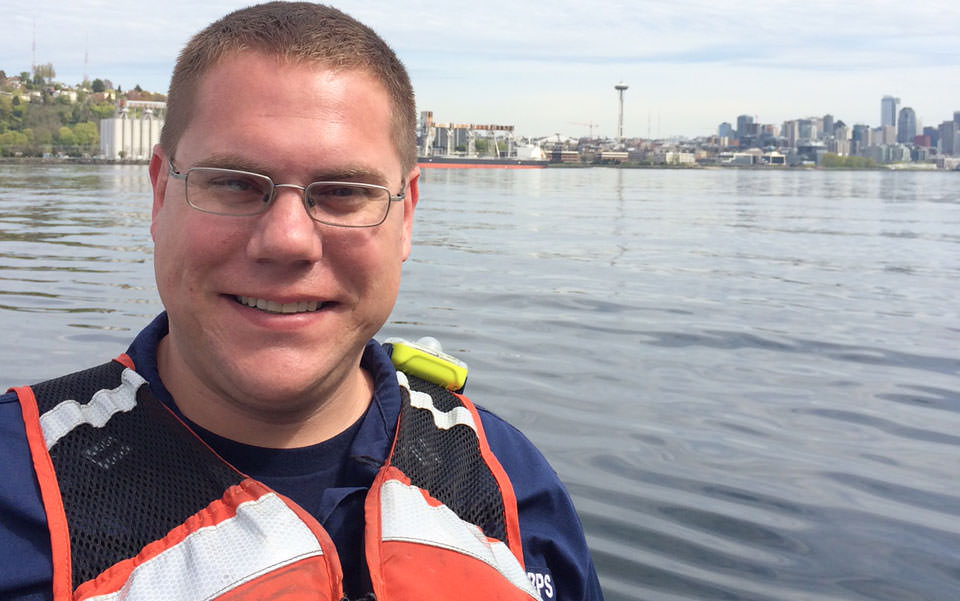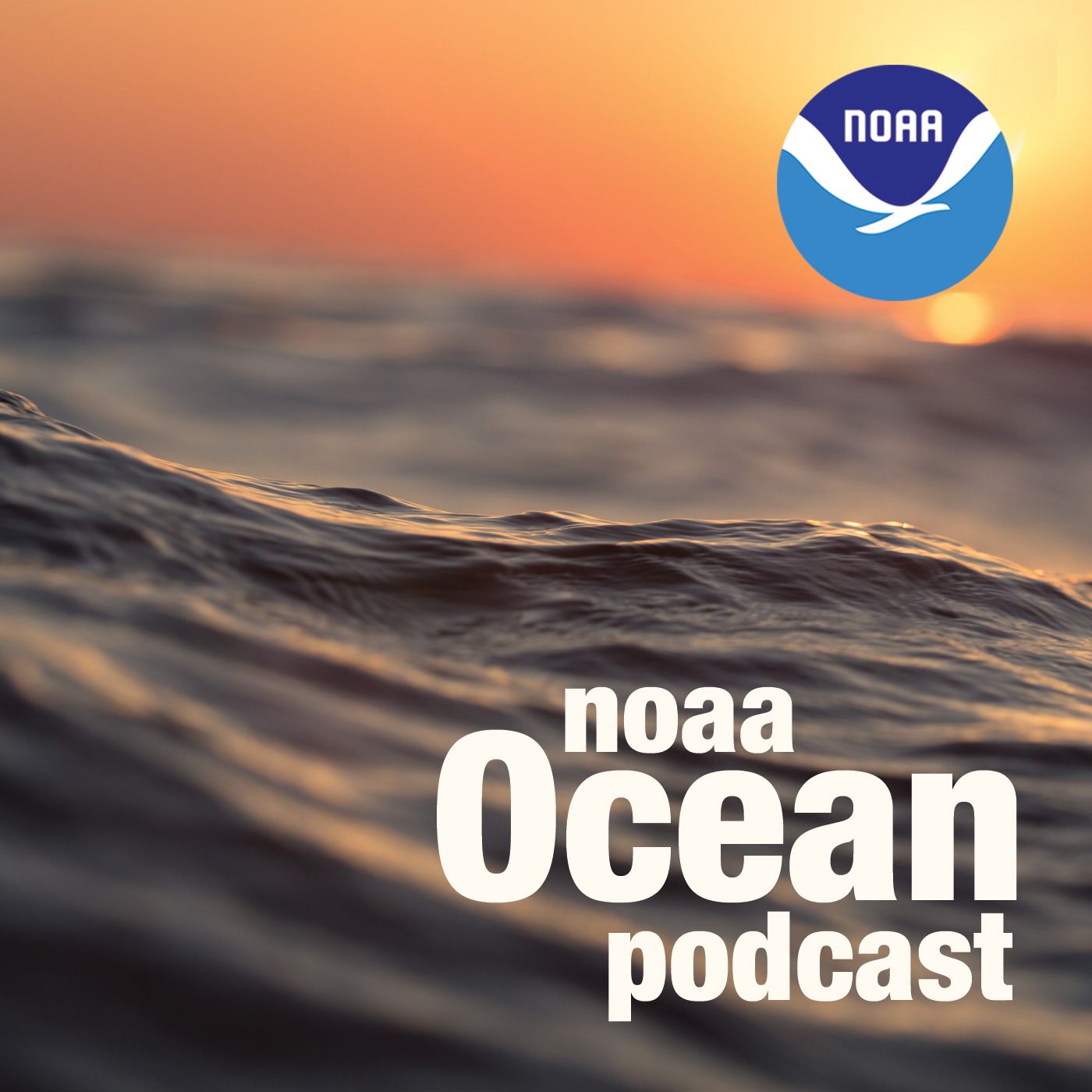Celebrating 100 Years of NOAA Corps
NOAA Ocean Podcast: Episode 07
In our latest podcast, we explore the history and work of NOAA's Commissioned Officer Corps—one of the seven uniformed services of the United States. NOAA Corps officers command NOAA's fleet of research and survey ships and also pilot NOAA's environmental data-gathering aircraft, including the agency's hurricane hunter planes. The NOAA Corps is celebrating a century of service to the nation in 2017.

Life at Sea or Scientist on Land
In this episode, Lt. Matt Forney, interagency liaison with NOAA's Office of Coast Survey, shares his thoughts and perspectives on the centennial anniversary of the NOAA Corps.
Transcript
Host: You're listening to the NOAA Ocean podcast! I'm Kate Nielsen. Following World War I, America saw an increase in the supply of reliable maps and the use of new technology to make navigation safer. Much of that activity can be traced to E. Lester Jones, director of the U.S. Coast and Geodetic Survey from 1915 to 1929. Jones was instrumental in creating the Coast and Geodetic Survey Commissioned Officer Corps in 1917, now known as the NOAA Commissioned Officer Corps—one of the seven uniformed services of the United States.
Today, NOAA Corps Officers serve on the sea, on land, and in the air in a wide variety of roles. NOAA Corps officers command NOAA's fleet of research and survey ships. NOAA Corps Officers also pilot NOAA's environmental data-gathering aircraft, including the agency's hurricane hunter planes. The NOAA Corps is celebrating a century of service to the nation this year, 2017.
Host: Joining us today is LT Matt Forney to talk about NOAA Corps. LT Forney is the interagency liaison for the NOAA Office of Coast Survey. Hi LT Forney—welcome to our show!
LT Matt Forney: Hey, good afternoon Kate!
Host: LT Forney, can you share with our listeners what is the connection between NOAA's Office of Coast Survey and the NOAA Corps?
LT Matt Forney: Our roots actually go all the way back to Thomas Jefferson when he signed a bill to commission the very first survey of the coast. He named the first superintendent as Ferdinand Hassler, but our birthday is really May 22, 1917. There was a law establishing the U.S. Coast and Geodetic Survey as the commissioned corps. After about two reorganizations in 1970, NOAA was established with the National Weather Service; National Marine Fisheries Service; Oceanic and Atmospheric Research; National Environmental Satellite, Data, and Information Service; and the National Ocean Service. We became the NOAA Corps serving in all five offices as well as the U.S. Coast Guard, NASA, Department of Defense, and the Department of State.
Host: So it sounds like the roots of NOAA Corps are in Coast Survey. How does NOAA Corps support the mission of NOAA Coast Survey?
LT Matt Forney: So NOAA Corps serve as both scientists and technical experts on our platforms collecting data to support the generation of nautical charts.
Host: And what inspired you to join the NOAA Corps?
LT Matt Forney: Well, that's a great question and I love it when folks ask that question of me. Ten years ago I was living in California of all places, being a guy originally from Cincinnati, Ohio, that's a little far from home. Growing up I was always a part of the boy scouts and I was wearing a uniform and I love the comradery and I always had this deep desire to do science and also serve the nation. And that's when I found NOAA Corps and it seemed like the best fit of all the services because I was able to use my love for science and passion, but also still wear a uniform and serve the United States of America. Really, growing up, it just kind of made sense, from Cincinnati, Ohio, the Ohio River was right there, I always saw all of these tug boats going up and down the river carrying all of these goods, and piles of coal and timber, and just goods moving across the country, and I was like, what does it take to be on one of those boats? And then I realized I could do science and be on one of those boats at the same time also supporting the movement of goods, not in the riverine system, but actually the whole world.
Host: Can you share with us what it's like working in the NOAA Corps?
LT Matt Forney: So the NOAA Corps is really a lot like any other job. You show up, you do your work, but the beautiful part about it is that you're expected to be a leader doing that work. And that’s where I find the best benefit is that you are a leader to not just do science, but also make that science become a reality and make it a part of everyday life in America.
Host: What are some of the positions that you've held? I know we talked about how NOAA Corps officers may be in the sky, on land, or in the water. What positions have you held?
LT Matt Forney: So Kate, I'm actually more of the sea-type guy. I've done, and mostly in Alaska of all places, I've done two sea tours in Alaska, both on the NOAA Ship Fairweather and that was a vessel that conducted hydrographic surveys for the support of making new nautical charts and also updating those nautical charts. I've also served on land in my current position as the interagency liaison for the Office of Coast Survey, but also as the navigation manager for Alaska where I pretty much brought all of the surveying priorities to NOAA from the users the users of our products.
Host: LT Forney, what has been your most memorable experience as a NOAA Corps officer?
LT Matt Forney: That's another really good question. One of my favorite parts of the NOAA Corps is that it takes you to some breath-taking, amazing places. And it's always funny how, at the time, maybe some of the worst experiences that you ever could imagine, have become the best and most memorable experiences. I believe it was back in 2009, I was in Glacier Bay National Park for about eight weeks. And part of doing hydrographic surveying is that you need to figure out what is your datum, where is the water level. So we were installing a water level station, a tide gauge, in Glacier Bay and it was one of the snottiest days I think I’ve ever seen. The wind was blowing, rain was pouring down, it was probably about 45 degrees and I was hanging off of a small cliff about six feet off the water, it was vertical, and someone was holding onto my lower half as my chest and head were hanging over trying to get a bolt into the rock. And while I was doing that there was this little gully I was laying in and water was kind of just running right down my belly and down my chest and off my chin right into the water. It was just that simple, funny thing that happened that the whole team out there started cracking up laughing and it just become a wonderful, beautiful day even though it was snotty, rainy, blowing, but we also had a glacier sitting right there that we were looking at while we were doing this. It made the beautiful days just seem that much more beautiful when you experience something like that and really the camaraderie of that experience made it an amazing experience.
Host: Great story, thanks LT Forney. And given that you can be out on a project or out on a mission for weeks at a time. What are some of the challenges involved, in your case working at sea?
LT Matt Forney: So working at sea, the hardest part I think is, you really don't get to go home from work. You end up sleeping, eating, and doing everything, even your recreation time trying to work out, you're always at work and someone always knows where to find you, especially when you are on a ship that's only 231 feet long, there's only so much real estate that 40+ people can occupy. So that's really one of the big challenges, but also the great part about this is just as there's a negative, there's also a positive and the beautiful part of being at sea is that you do form that camaraderie, you form friendships for life. The great part is, they're not just your colleague, but they're also a trusted friend. So I think the quality of work that comes out of that environment is just that much better because you don't want to let your buddy down sitting next to you who's not just a co-worker, but also a buddy. And they are relying on something that you produce just as you're relying on something that they produce.
Host: How can someone apply to be in the NOAA Corps? If one of our listeners today hears this interview and they're really inspired by the experiences and the work that you're able to do, how can they join NOAA Corps?
LT Matt Forney: So Kate, I knew this question was coming and I did my homework. I actually checked all of the major search engines and if you simply search NOAA Corps, the very first thing that pops up is the link to the NOAA Corps page that tells you all about our history, all about what you can expect, and it tells you exactly how you can apply to become a NOAA Corps officer. And believe me, I know the recruiters, they're amazing folks, please don't hesitate to contact them with any questions or concerns.
Host: LT Forney, I always like to ask everyone that we interview if they have any final, closing words to leave our listeners with?
LT Matt Forney: Really Kate I just want to thank you for having me here and it's a wonderful honor to be here to participate in this podcast. Really, I'm just excited to be a part of the century of service during this centennial year and I look forward to another 100 years of service for the NOAA Corps.
Host: That's it for this episode of the NOAA Ocean Podcast. Thanks to LT Matt Forney for talking with us about his experience with NOAA Corps. To learn more visit our website at oceanservice.noaa.gov. We appreciate you taking the time to learn with us and hope you'll join us again soon. Until then...thanks for listening!

From corals to coastal science, connect with ocean experts to explore questions about the ocean environment.
Subscribe to Feed | Subscribe in iTunes
Browse All Episodes of the NOAA Ocean podcast